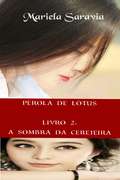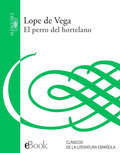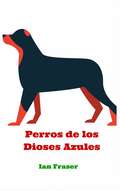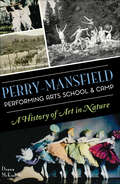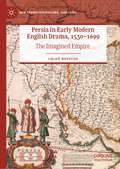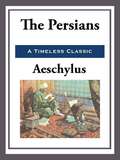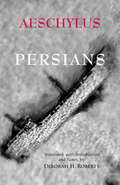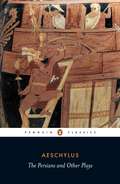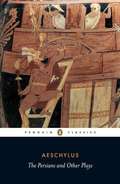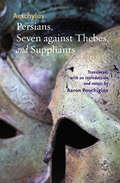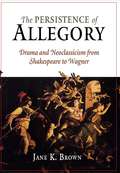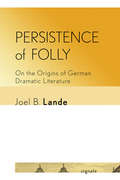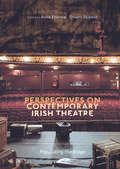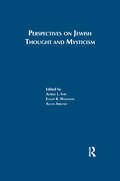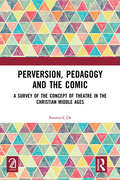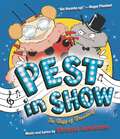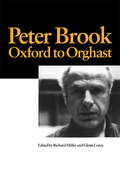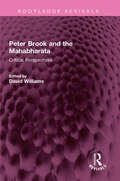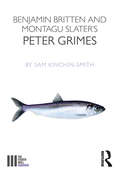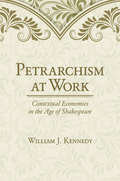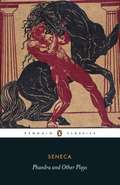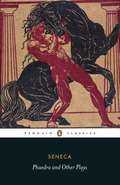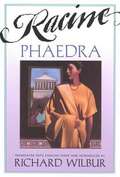- Table View
- List View
Pérola de Lótus - livro 2: a sombra da cerejeira
by Mariela Saravia Ana Paula Ruth LimaCom a morte de Donovan, Kiele deixe de se sentir parte de Londres e de Adolf, aquele homem que tanto ama, pois seu sangue inglês foi à maldição de seu povo. Trabalha em diferentes ofícios, até que chega a uma família londrina estabelecida na China e se transforma na instrutora da filha de um poderoso empresário. Rubén Mosses é um homem de poder, que procura a forma de fazê-la sua amante, mas quando Kiele está disposta da lhe dar uma relação extra-matrimonial, estoura a Segunda Guerra do Ópio, que a obriga se separar daquela família que a acolheu por seis anos e, sobretudo, da menina Catarina que nessa época já era uma jovem de quinze anos. Diante da noticia de que a China se encontra em Guerra de novo, Adolf McColl realiza a viajem para China que estava adiando, agora não em busca de tecidos para seu império, mas sim para proteger a única mulher que amou e segue amando. Mas, as visões da morte não o deixam em paz, e a dúvida de não saber se Kiele está viva ou morta, lhe torturam até o cansaço.
El perro del hortelano (Teatro Ser. #Vol. 14)
by Lope de VegaLlamada también La condesa de Belflor, es un ejemplo de comedia de enredo y costumbres, escrita hacia 1618. Diana, la condesa, está enamorada de su secretario Teodoro, que ama a Marcela, aunque está dispuesto a prestar oídos a su señora. Pero Diana se encuentra en un dilema: ni quiere casarse con él porque no pertenece a su clase, ni le da el consentimiento para que se case con Marcela. Sin embargo, cuando se entera de que Teodoro puede ser descendiente del conde Ludovico, acaban sus dudas.
Perros de los Dioses Azules
by Ian Fraser Mara Doménech De SeingaltEsta entrañable obra de teatro, hecha tanto para jóvenes como para adultos, enseña el valor de la libertad a través de unos perros policías entrenados para atacar. Esta obra sirve de metáfora sobre la verdadera libertad, la que se elige, y aquella que viene impuesta. Una magnífica obra de teatro, ocurrente, simpática y que al mismo tiempo que hace reflexionar sobre la libertad, ya sea nuestra o de cualquier animal, ofrece unos momentos divertidos sin dudarlo.
Perry-Mansfield Performing Arts School & Camp: A History of Art in Nature (Landmarks)
by Dagny McKinleyIn 1914, Charlotte Perry and Portia Mansfield envisioned a secluded institution nestled in the mountains, where art and nature could intersect. By the 1920s, their remote Perry-Mansfield Performing Arts School & Camp in Steamboat Springs was serving as a hub for top dancers such as José Limon and Harriette Ann Gray to hone their craft. In addition to training thousands of pointed toes and arched feet, the school showcased equestrian jumping and performed plays by masters, including Shakespeare, García Lorca and Tennessee Williams. The theater program eventually attracted budding actors like Julie Harris, Dustin Hoffman and Jessica Biel. Author Dagny McKinley presents the story of America's longest continuously running performing arts camp.
Persia in Early Modern English Drama, 1530–1699: The Imagined Empire (New Transculturalisms, 1400–1800)
by Chloë HoustonThis book is a study of the representation of the Persian empire in English drama across the early modern period, from the 1530s to the 1690s. The wide focus of this book, encompassing thirteen dramatic entertainments, both canonical and little-known, allow it to trace the changes and developments in the dramatic use of Persia and its people across one and a half centuries. It explores what Persia signified to English playwrights and audiences in this period; the ideas and associations conjured up by mention of ‘Persia’; and where information about Persia came from. It also considers how ideas about Persia changed with the development of global travel and trade, as English people came into people with Persians for the first time. In addressing these issues, this book provides an examination not only of the representation of Persia in dramatic material, but of the broader relationship between travel, politics and the theatre in early modern England.
The Persians
by AeschylusThe Persians is an Athenian tragedy by the ancient Greek playwright Aeschylus. First produced in 472 BC, it is the oldest surviving play in the history of theatre. It dramatises the Persian response to news of their military defeat at the Battle of Salamis (480 BC), which was a decisive episode in the Greco-Persian Wars; as such, the play is also notable for being the only extant Greek tragedy that is based on contemporary events.
Persians (Hackett Classics)
by AeschylusThe only surviving play of Aeschylus to be based on a historical event—the Greek victory at Salamis just a few years before the play was written—Persians appears in Deborah H. Roberts' brilliant new verse translation accompanied by her Introduction, Notes, Maps, and Chronology. Also included are newly translated excerpts from Herodotus&’ Histories that should fascinate any reader of the play.
The Persians and Other Plays: The Persians / Prometheus Bound / Seven Against Thebes / The Suppliants
by AeschylusAeschylus (525-456 BC) brought a new grandeur and epic sweep to the drama of classical Athens, raising it to the status of high art. The Persians, the only Greek tragedy to deal with events from recent Athenian history, depicts the final defeat of Persia in the battle of Salamis, through the eyes of the Persian court of King Xerxes, becoming a tragic lesson in tyranny. In Prometheus Bound, the defiant Titan Prometheus is brutally punished by Zeus for daring to improve the state of wretchedness and servitude in which mankind is kept. Seven Against Thebes shows the inexorable downfall of the last members of the cursed family of Oedipus, while The Suppliants relates the pursuit of the fifty daughters of Danaus by the fifty sons of Aegyptus, and their final rescue by a heroic king.
The Persians And Other Plays
by Aeschylus Alan H. SommersteinAeschylus (525-456 BC) brought a new grandeur and epic sweep to the drama of classical Athens, raising it to the status of high art. The Persians, the only Greek tragedy to deal with events from recent Athenian history, depicts the final defeat of Persia in the battle of Salamis, through the eyes of the Persian court of King Xerxes, becoming a tragic lesson in tyranny. In Prometheus Bound, the defiant Titan Prometheus is brutally punished by Zeus for daring to improve the state of wretchedness and servitude in which mankind is kept. Seven Against Thebes shows the inexorable downfall of the last members of the cursed family of Oedipus, while The Suppliants relates the pursuit of the fifty daughters of Danaus by the fifty sons of Aegyptus, and their final rescue by a heroic king.
Persians, Seven against Thebes, and Suppliants (Johns Hopkins New Translations from Antiquity)
by AeschylusAaron Poochigian’s new translations of Aeschylus’s earliest extant plays provide the clearest rendering yet of their formal structure. The distinction between spoken and sung rhythms is as sharp as it is in the source texts, and for the first time readers in English can fully grasp the balanced, harmonious arrangement of choral odes. The importance of these works to the history of drama and tragedy and to the history of classical literature is beyond question, and their themes of military hubris and foreign versus native are deeply relevant today. Persians offers a surprisingly sympathetic portrayal of the Athenians’ most hated enemy; in Seven against Thebes Argive invaders, though no less Greek than the Thebans themselves, are portrayed as barbarians; and in Suppliants the city of Argos is called upon to protect Egyptian refugees. Based on textual evidence and the archaeological remains of the Theater of Dionysus at Athens, Poochigian’s introductory overview of stage properties and accompanying stage directions allow readers to experience the plays as they were performed in their own time. He is most careful in his translations of the plays’ choral odes. Instead of rendering them with little or no form, Poochigian has preserved the comprehensive structures Aeschylus himself employed. Readers are thus able to recognize Aeschylus as a master of poetry as well as of drama. Poochigian’s translations are the most accurate renditions of the poetry and dramaturgy of the original works available. Intended to be both read as literature and performed as plays, these translations are lucid and readable, while remaining staunchly faithful to the texts.
The Persistence of Allegory
by Jane K. BrownIn an impressively comparative work, Jane K. Brown explores the tension in European drama between allegory and neoclassicism from the sixteenth through the nineteenth century. Imitation of nature is generally thought to triumph over religious allegory in the Elizabethan and French classical theater, a shift attributable to the recovery of Aristotle's Poetics in the Renaissance. But if Aristotle's terminology was rapidly assimilated, Brown demonstrates that change in dramatic practice took place only gradually and partially and that allegory was never fully cast off the stage. The book traces a complex history of neoclassicism in which new allegorical forms flourish and older ones are constantly revitalized. Brown reveals the allegorical survivals in the works of such major figures as Shakespeare, Calderón, Racine, Vondel, Metastasio, Goethe, and Wagner and reads tragedy, comedy, masque, opera, and school drama together rather than as separate developments. Throughout, she draws illuminating parallels to modes of representation in the visual arts.A work of broad interest to scholars, teachers, and students of theatrical form, The Persistence of Allegory presents a fundamental rethinking of the history of European drama.
Persistence of Folly: On the Origins of German Dramatic Literature (Signale: Modern German Letters, Cultures, and Thought)
by Joel B. LandeJoel B. Lande’s Persistence of Folly challenges the accepted account of the origins of German theater by focusing on the misunderstood figure of the fool, whose spontaneous and impish jest captivated audiences, critics, and playwrights from the late sixteenth through the early nineteenth century. Lande radically expands the scope of literary historical inquiry, showing that the fool was not a distraction from attempts to establish a serious dramatic tradition in the German language. Instead, the fool was both a fixture on the stage and a nearly ubiquitous theme in an array of literary critical, governmental, moral-philosophical, and medical discourses, figuring centrally in broad-based efforts to assign laughter a proper time, place, and proportion in society.Persistence of Folly reveals the fool as a cornerstone of the dynamic process that culminated in the works of Lessing, Goethe, and Kleist. By reorienting the history of German theater, Lande’s work conclusively shows that the highpoint of German literature around 1800 did not eliminate irreverent jest in the name of serious drama, but instead developed highly refined techniques for integrating the comic tradition of the stage fool.
Perspectives on Contemporary Irish Theatre
by Anne Etienne Thierry DubostThis book addresses the notion posed by Thomas Kilroy in his definition of a playwright's creative process: 'We write plays, I feel, in order to populate the stage'. It gathers eclectic reflections on contemporary Irish theatre from both Irish theatre practitioners and international academics. The eighteen contributions offer innovative perspectives on Irish theatre since the early 1990s up to the present, testifying to the development of themes explored by emerging and established playwrights as well as to the (r)evolutions in practices and approaches to the stage that have taken place in the last thirty years. This cross-disciplinary collection devotes as much attention to contextual questions and approaches to the stage in practice as it does to the play text in its traditional and revised forms. The essays and interviews encourage dialectic exchange between analytical studies on contemporary Irish theatre and contributions by theatre practitioners.
Perspectives on Jewish Though
by IvryFirst Published in 1998. Routledge is an imprint of Taylor & Francis, an informa company.
Perversion, Pedagogy and the Comic: A Survey of the Concept of Theatre in the Christian Middle Ages
by Soumick DePerversion, Pedagogy and the Comic studies how the idea-of-theater shaped western consciousness during the Christian Middle Ages. It analyses developments within western philosophy, Christian theology and theater history to show how this idea realized itself primarily as a metaphor circulating through various discursive domains. Beginning with Plato’s injunction against tragedy the relation between philosophy and theater has been a complicated affair which this book traces at the threshold when the western world became Christian. By late antiquity as theatre was slowly banned, Christian theology put the idea-of-theatre to use in order to show what they understood to be the perverted nature of worldly existence and the mystery of the Kingdom of God. Interrogating the theological teachings of some of the early Church Fathers like St Augustine, Tertullian and Clement of Alexandria the book offers a new look at how the idea of theater not only inspired Christian liturgical practices but Christian pedagogy in general which in turn shaped the nature of Christian religious drama. Finally the author tries to demonstrate how this hegemonic use of the theatre-idea was countered by a certain comic sensibility which opened the idea of theatre in the Christian Middle Ages to a new and subversive materialist possibility. Please note: Taylor & Francis does not sell or distribute the Hardback in India, Pakistan, Nepal, Bhutan, Bangladesh and Sri Lanka.
Pest In Show
by Victoria JamiesonLadybug knows she was born to be a star. She can't wait to sing and dance in her newest musical, which will be her best show ever. Ladybug won't let anyone get in the way of her performance...especially her little brother, Fly. He's a pest! But Fly is determined to be part of the act, no matter what. Is the show big enough for this sibling rivalry?This sing-along, read-aloud, funny tribute to the budding Broadway star in all of us is sure to be a smash hit, and shows that working together really does pay off.
Peter Brook: Oxford To Orghast To India
by R. Helfer G. LoneyPeter Brook is known internationally as a theatre visionary, and a daring experimenter on the cutting-edge of performance and production. This book concentrates on Brook's early years, and his innovative achievements in opera, television, film, and the theatre. His productions are viewed separately, in chronological order, suggesting Brook's developing and changing interests. The authors include thought-provoking interviews with Brook (and with numerous outstanding artists who have worked with him) and bring to the reader penetrating critiques of Brook's theories and practices as a man of the theatre.
Peter Brook and the Mahabharata: Critical Perspectives (Routledge Revivals)
by David WilliamsFirst published in 1991, Peter Brook and the Mahabharata is a collection of essays which contextualizes the production of Peter Brook’s The Mahabharata. Written by both scholars and collaborators on Brook’s production, these essays seek not only to discuss such issues as the politics of theatre interculturalism, but to describe the nature of the working process, and detail the technical problems engendered by touring a production of this size and complexity. Furnished with a new preface by the editor, the book continues to be crucial research work devoted to unravelling the mesmerising as well as the polarising enigma known as Peter Brook’s The Mahabharata. Thoroughly heterogenous and controversially irreverent, this book will be of interest to students of theatre, performance art, literature, South Asian studies and media studies.
Peter Grimes
by Sam Kinchin-Smithã `Who can turn skies back and begin again?' -Peter ã This book contends that Peter Grimes, widely regarded as one of the greatest and most influential operas of the 20th century, is also one of the British theatre's finest `lost' plays. Seeking to liberate Britten and Slater's work from the blinkered traditions of theatre and opera criticism, Sam Kinchin-Smith poses two questions: If an opera was created like a play, and can be staged as a play, is it a play? If a portion of its success and influence is the product of this newly identified theatrical engine, is it then a great play? The answers involve Wagner and W.G. Sebald, George Crabbe and Complicite, Akenfield and Twin Peaks. Challenging long-established narratives of post-war theatre history, this book makes a compelling case for why practitioners and scholars of performance ought to pay more attention to Britten and Slater's achievement - a milestone of unconventional English modernism - and perhaps to other operatic masterpieces too.
Petrarchism at Work: Contextual Economies in the Age of Shakespeare
by William J. KennedyThe Italian scholar and poet Francesco Petrarch (1304–1374) is best remembered today for vibrant and impassioned love poetry that helped to establish Italian as a literary language. Petrarch inspired later Renaissance writers, who produced an extraordinary body of work regarded today as perhaps the high-water mark of poetic productivity in the European West. These "Petrarchan" poets were self-consciously aware of themselves as poets—as craftsmen, revisers, and professionals. As William J. Kennedy shows in Petrarchism at Work, this commitment to professionalism and the mastery of poetic craft is essential to understanding Petrarch's legacy.Petrarchism at Work contributes to recent scholarship that explores relationships between poetics and economic history in early-modern European literature. Kennedy traces the development of a Renaissance aesthetics from one based upon Platonic intuition and visionary furor to one grounded in Aristotelian craftsmanship and technique. Their polarities harbor economic consequences, the first privileging the poet’s divinely endowed talent, rewarded by the autocratic largess of patrons, the other emphasizing the poet’s acquired skill and hard work. Petrarch was the first to exploit the tensions between these polarities, followed by his poetic successors. These include Gaspara Stampa in the emergent salon society of Venice, Michelangelo Buonarroti in the “gift” economy of Medici Florence and papal Rome, Pierre de Ronsard and the poets of his Pléiade brigade in the fluctuant Valois court, and William Shakespeare and his contemporaries in the commercial world of Elizabethan and early Stuart London. As Kennedy shows, the poetic practices of revision and redaction by Petrarch and his successors exemplify the transition from a premodern economy of patronage to an early modern economy dominated by unstable market forces.
Phaedra and Other Plays
by SenecaLiving in Rome under Caligula and later a tutor to Nero, Seneca witnessed the extremes of human behaviour. His shocking and bloodthirsty plays not only reflect a brutal period of history but also show how guilt, sorrow, anger and desire lead individuals to violence. The hero of Hercules Insane saves his own family from slaughter, only to commit further atrocities when he goes mad. The horrifying death of Astyanax is recounted in Trojan Women, and Phaedra deals with forbidden love. In Oedipus a nervous man discovers himself, while Thyestes recounts the bitter family struggle for a crown. Of uncertain authorship, Octavia dramatizes Nero's divorce from his wife and her deportation. The only Latin tragedies to have survived complete, these plays are masterpieces of vibrant, muscular language and psychological insight.
Phaedra And Other Plays
by Seneca R. SmithLiving in Rome under Caligula and later a tutor to Nero, Seneca witnessed the extremes of human behaviour. His shocking and bloodthirsty plays not only reflect a brutal period of history but also show how guilt, sorrow, anger and desire lead individuals to violence. The hero of Hercules Insane saves his own family from slaughter, only to commit further atrocities when he goes mad. The horrifying death of Astyanax is recounted in Trojan Women, and Phaedra deals with forbidden love. In Oedipus a nervous man discovers himself, while Thyestes recounts the bitter family struggle for a crown. Of uncertain authorship, Octavia dramatizes Nero’s divorce from his wife and her deportation. The only Latin tragedies to have survived complete, these plays are masterpieces of vibrant, muscular language and psychological insight.
Phaedra, by Racine
by Richard WilburPhaedra is consumed with passion for Hippolytus, her stepson. Believing her husband dead, she confesses her love to him and is rebuffed. When her husband returns alive, Phaedra convinces him that it was Hippolytus who attempted to seduce her. In his interpretation, Racine replaced the stylized tragedy with human-scale characters and actions. Introduction by Richard Wilbur.
